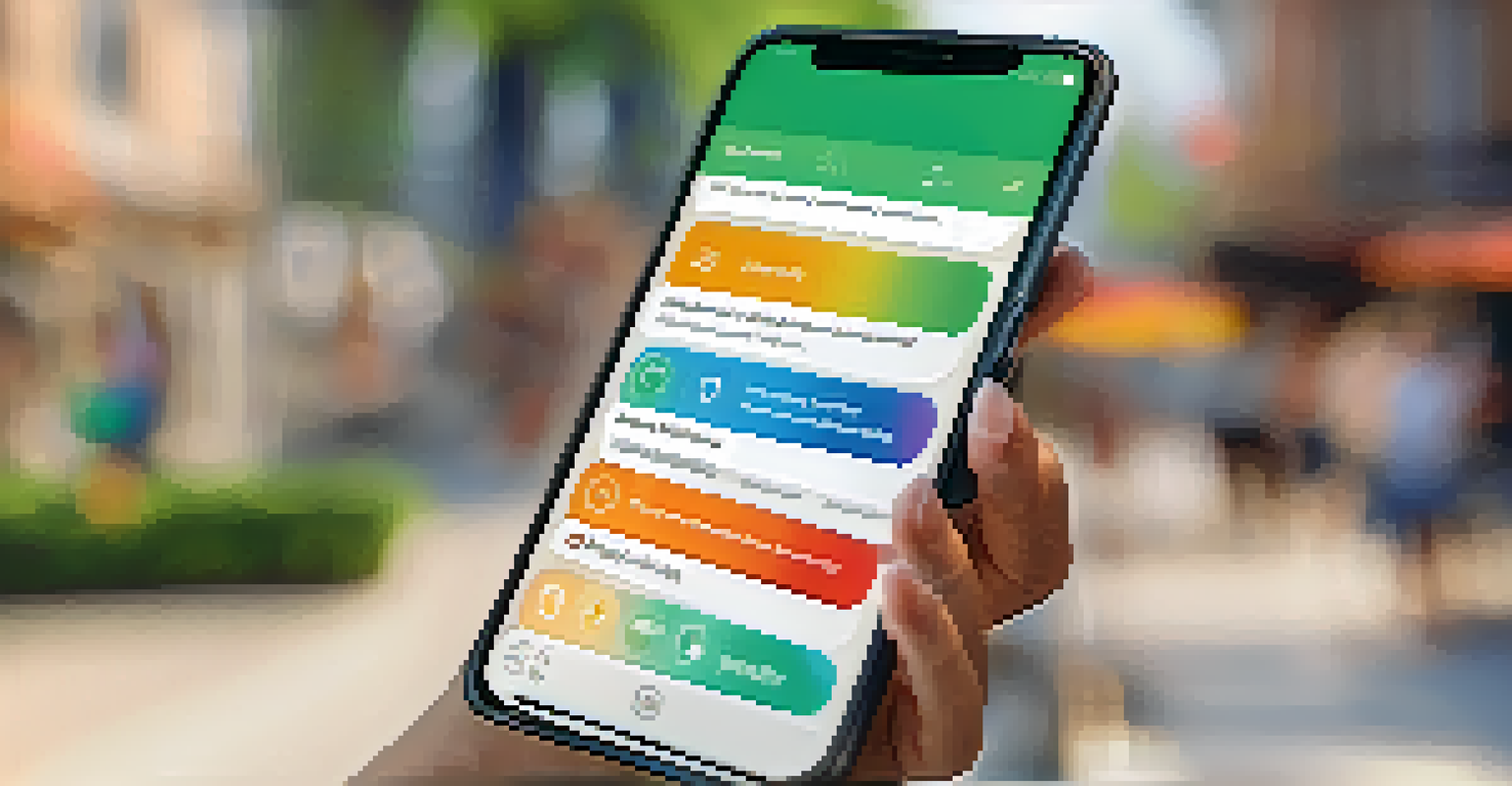Mobile Apps: Balancing Functionality and Privacy

Understanding the Importance of Functionality in Mobile Apps
When we think about mobile apps, functionality is often the first thing that comes to mind. Users expect seamless navigation, quick loading times, and features that enhance their daily lives, whether it's a fitness tracker or a shopping app. The more intuitive and responsive an app is, the more likely users are to keep it around and engage with it regularly.
In the end, it's not the technology that matters, but the people who use it and how it respects their privacy.
However, functionality shouldn’t come at the expense of user privacy. Many users are willing to trade some of their personal data for a better user experience, but that doesn't mean all apps should collect extensive information. Striking the right balance between offering useful features and respecting user privacy is crucial for building trust and fostering long-term relationships with users.
For example, a weather app that provides hyper-local forecasts could use location data to enhance its functionality. Yet, if it collects unnecessary personal details, like contacts or call logs, users may feel uncomfortable and uninstall the app. Thus, understanding what data is essential for functionality without overstepping privacy boundaries is key.
The Privacy Concerns Surrounding Mobile Apps
In today’s digital age, privacy concerns are more prevalent than ever. High-profile data breaches and misuse of personal information have left users wary of how their data is handled. This skepticism means that app developers must be transparent about what data is collected and why, which can sometimes conflict with the desire to enhance app functionality.

Many users are unaware of the extent to which their information is shared or sold to third parties. A simple permissions request can raise eyebrows, especially if users feel that the app's functionality does not justify the data being requested. This situation paints a picture of a growing tension between users wanting useful apps and the fear of being tracked or exploited.
Functionality vs. User Privacy
Balancing app functionality with user privacy is essential for building trust and ensuring long-term user engagement.
For instance, social media apps often ask for access to other personal information, such as location and contacts, to function optimally. While these features can improve user experience, it’s crucial for developers to provide clear explanations of why such data is necessary, which can help ease concerns and build trust.
Finding a Balance: User-Centric Design and Privacy
User-centric design is the heart of creating mobile apps that respect both functionality and privacy. This approach involves understanding user needs and preferences while ensuring that privacy measures are baked into the app from the ground up. By prioritizing user experience, developers can create apps that do not compromise on security, thus fostering trust and loyalty.
Privacy is not something that I'm merely entitled to, it's an absolute prerequisite.
A great example of user-centric design is the ability for users to customize their privacy settings. Apps that allow users to selectively share information, rather than forcing blanket permissions, empower individuals and make them feel in control of their data. This not only enhances user satisfaction but also helps companies avoid potential backlash over privacy issues.
Moreover, involving users in the design process can lead to innovative solutions that benefit both functionality and privacy. Gathering feedback through surveys or beta testing can reveal what features users value the most, guiding developers on how to proceed without overstepping privacy boundaries.
Regulatory Frameworks Influencing App Development
As privacy concerns grow, various regulatory frameworks have emerged to protect users. Laws like the General Data Protection Regulation (GDPR) in Europe set strict guidelines on how personal data should be collected, stored, and used. App developers must navigate these regulations carefully to ensure compliance, which can sometimes conflict with their ability to innovate and provide new functionalities.
Compliance with these regulations not only helps protect users but also serves as a competitive advantage. Apps that prioritize user privacy and adhere to regulations can attract more users who are increasingly concerned about their data security. This alignment can create a positive feedback loop where privacy becomes a selling point, rather than a barrier to functionality.
User-Centric Design Matters
Involving users in the design process and allowing them to customize privacy settings can enhance satisfaction and loyalty.
For example, a financial app that strictly adheres to regulations can assure users that their sensitive information is secure. This transparency can foster a sense of trust, encouraging users to engage more deeply with the app's features, knowing their privacy is being respected.
Innovative Technologies Enhancing Privacy in Apps
The tech industry is constantly evolving, and with it comes innovative tools designed to enhance privacy without sacrificing functionality. Technologies like end-to-end encryption and artificial intelligence can help secure user data while providing personalized experiences. By employing these technologies, developers can create apps that respect user privacy while also delivering the functionality users expect.
For instance, incorporating AI can help apps analyze user behavior to deliver customized content without necessarily storing sensitive personal information. This way, apps can learn what users like and provide tailored recommendations without compromising their data security. This balance is crucial for retaining user trust and satisfaction.
Additionally, blockchain technology offers a promising solution for privacy concerns. By decentralizing data storage, users can have more control over their information and how it’s shared. Apps utilizing blockchain can provide transparency and security, allowing users to enjoy rich functionalities without fear of data misuse.
User Education: Empowering Users to Protect Their Privacy
Educating users about privacy is essential in the age of mobile apps. Many people may not fully understand the implications of sharing their data or how to manage their privacy settings effectively. Developers can play a critical role in empowering users by providing clear information about their data practices and offering easily accessible privacy controls within the app.
Creating informative content, such as blog posts or tutorials, can help users navigate privacy settings and understand what data they are sharing. This approach not only builds trust but also fosters a community of informed users who feel confident in their choices. When users are educated about privacy, they are more likely to engage with apps that prioritize their security.
Future Trends Favor Privacy
The mobile app landscape is shifting towards a privacy-first approach, creating opportunities for innovation while respecting user data.
Moreover, user education can lead to better feedback for developers. Informed users are more likely to voice concerns or suggest improvements regarding privacy features, allowing developers to refine their apps and enhance user satisfaction. In this way, education acts as a bridge between functionality and privacy.
The Future of Mobile Apps: A Privacy-First Approach
Looking ahead, the future of mobile apps will likely lean towards a privacy-first approach. As users become more aware of their digital footprints and data rights, they will demand transparency and control over their information. Developers who prioritize privacy while maintaining high functionality will stand out in a crowded market, as users increasingly seek apps that align with their values.
This shift opens up exciting opportunities for innovation. Developers can explore new ways to deliver functionalities without compromising user privacy, such as utilizing anonymized data or offering opt-in features that enhance user experience. By embracing this mindset, companies can create apps that resonate with a privacy-conscious audience.

Ultimately, the balance between functionality and privacy is not just a challenge; it's an opportunity for growth. By listening to user feedback, adhering to regulations, and leveraging innovative technologies, the mobile app landscape can evolve in a way that respects user privacy while delivering the functionality that makes our lives easier.